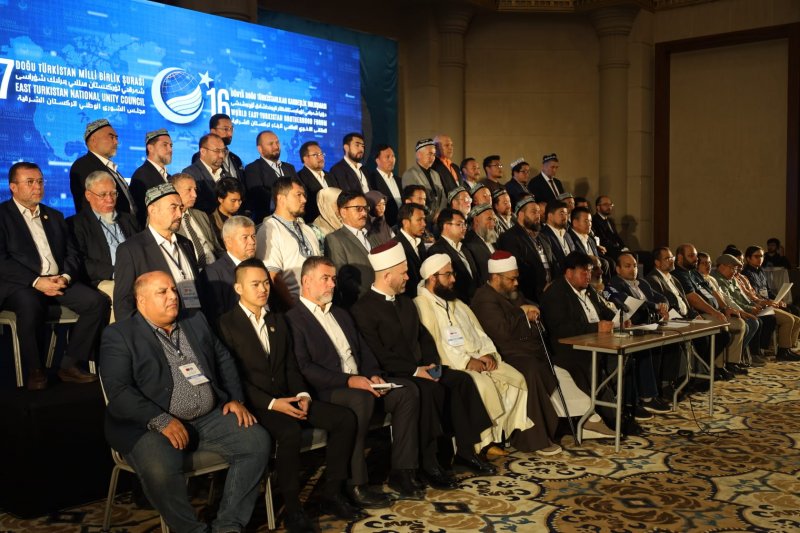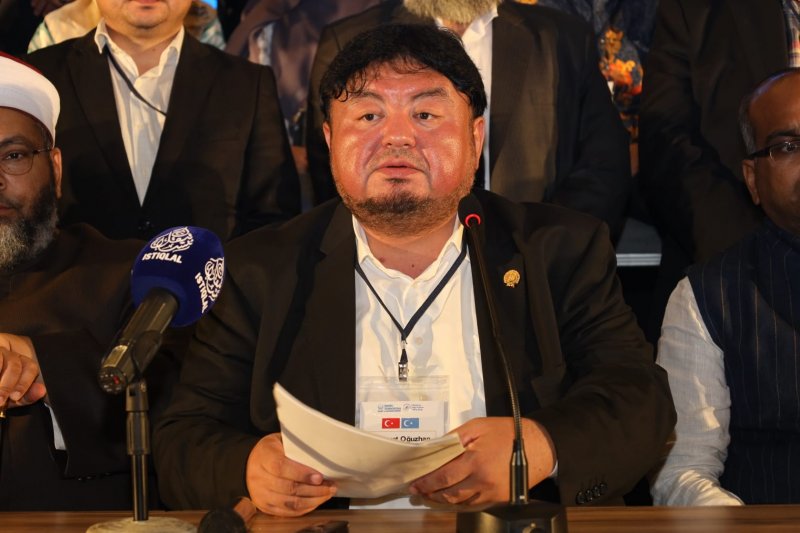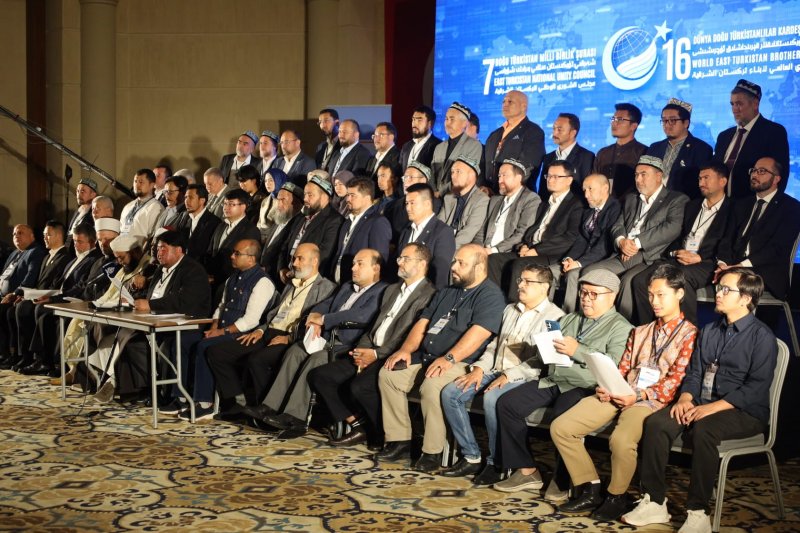




16th World East Turkistan Brotherhood Meeting and 7th East Turkistan National Unity Council Declaration
The 16th World East Turkistan Brotherhood Meeting and the 7th East Turkistan National Unity Council took place in Istanbul from October 4-7, 2024, with over 200 attendees from 31 countries. In addition to the participation of elites, opinion leaders, and organizational representatives from the East Turkestan diaspora around the world, more than 50 politicians, members of parliament, diplomats, statesmen, academics, youth leaders, and representatives of civil society have also attended the event.
The central theme of the event was "The 10-Year Xi Jinping Era: Genocide, Consequences, and Impacts." Leaders of the East Turkistan cause, organizational heads, academics, politicians, and human rights advocates held in-depth discussions and analysis regarding the assimilation and colonial policies in East Turkistan, which has persisted for 75 years under Chinese occupation, as well as the ongoing genocide policies. The main topics discussed in six key areas were:
-
The National Impact of Genocide – Characteristics, Consequences, and Effects
-
The Expanding Chinese Threat in Asia
-
China’s Growing Power and the Global Repercussions of the East Turkistan Genocide
-
China’s Increasing Influence in the Arab-Islamic World and the East Turkistan Issue
-
Ways to Stop the Genocide and End the Occupation
-
East Turkistan's Independence and Its Principles
During the meeting, comprehensive discussions were held on China’s 75-year occupation and colonial policies, especially the mass internment policies of the last 10 years, forced labor, birth control restrictions, limitations on free movement, the isolation of East Turkestan from the world, the imprisonment of millions of people, the suppression of Islam, the banning of national education and the Uyghur language, the Sinicization of culture, and other systematic genocide policies. In parallel, China's expansionist policies in Asia, including its predatory diplomacy, debt-trap diplomacy, the "Belt and Road Initiative," border conflicts with India, the exacerbation of Myanmar’s civil war, and the undermining of the political independence of Central Asian countries, were also examined. The direct threats posed to many countries and peoples by China's growing influence in regional and global politics were emphasized.
It was also highlighted that the ongoing genocide in East Turkistan serves as a political and economic guarantee for China's expansionist strategy. The fate of the people of East Turkistan is directly linked to their survival, property, and freedom. Representatives from countries that have gained independence shared their experiences, stressing that the struggle against colonialism and occupation is long and arduous, but with determination, sustained efforts, and political wisdom, independence can be achieved. They called on the people of East Turkestan to unite, cooperate, and act together in their pursuit of independence.
Furthermore, it was stressed that the fight for East Turkestan’s independence, the freedom of its people, and the end of the genocide is a legitimate struggle. The will of the people of East Turkestan for independence will not be abandoned. The international community must respect the will of the people and the historical facts, and it is both essential and a responsibility for the international community to support this cause justly, based on international law.
Workshops and closed meetings were held with delegations from various countries and regions on topics such as public diplomacy, the role of religious scholars in the East Turkestan cause, cooperation among youth, the crisis of national identity, forced labor, and human rights violations. Practical decisions were made regarding the future phases of the East Turkestan cause.
The main points discussed and decided upon in the meeting are as follows:
-
The independence of East Turkestan is the core principle of the cause. The struggle for independence is the legitimate right of the people of East Turkestan, and it is vital to protect and support this struggle.
-
The only way to end the genocide in East Turkestan and ensure the true freedom and national existence of its people is through independence.
-
The international community, including international law, human rights organizations, the United Nations, the Organization of Islamic Cooperation, the Turkic States Organization, and the European Union, has failed to adequately fulfill its responsibilities in stopping the genocide and human rights violations, and there is evident double-standard behavior.
-
Forced labor is a significant tool of the ongoing genocide in East Turkestan, and efforts to list and ban products produced through forced labor in various countries are crucial.
-
The Belt and Road Initiative and its supply chains are central sources of China’s international hegemony.
-
China’s economic and trade-based expansionist policies in the Middle East and Africa present opportunities and avenues for action for the East Turkestan cause in these regions.
-
The Islamic world has not provided sufficient support to the East Turkestan cause due to close ties with China, and this situation must be addressed to create a more favorable environment for the East Turkestan struggle.
-
The geostrategic importance of neighboring countries to East Turkestan, particularly India’s critical role in the cause, was emphasized.
-
The experiences of countries and regions that were once colonized, such as India, Malaysia, Indonesia, the Balkan countries, and Algeria, inspire hope for the independence struggle of the people of East Turkestan.
-
Professionalism and the inclusion of younger generations in the organizational structures of the East Turkestan movement are crucial, and the International Union of East Turkestan NGOs and its member organizations have made significant strides in this area.
-
New strategies and international cooperation platforms must be developed for East Turkestan. The soft power of East Turkestan has to be promoted worldwide through culture, religion, academic research, and social movements.
-
The effective use of media, international law, organizations, mass movements, boycott campaigns, and other means are essential to stop the genocide.
As organizers and participants of the 16th World East Turkestan Brotherhood Meeting and the 7th East Turkestan National Unity Council, we call on all countries and international organizations to take immediate action to stop the genocide in East Turkestan. We affirm that the efforts and struggles of the people of East Turkestan have always been just. We argue that the individuals and organizations leading the East Turkestan cause should be recognized and supported by the international community.
In this regard, we also call for an immediate end to the human rights tragedies ongoing in Palestine, Lebanon, and other countries in the Middle East, the prevention of the spread of war, and active engagement in international justice and human rights mechanisms.
Finally, we extend our gratitude to all our guests from around the world, and we pray for our hope and determination to accompany you always, in our future endeavors. Thank you all.
Sincerely,
Hidayet Oğuzhan
President of the East Turkestan Education and Solidarity Association
President of the International Union of East Turkistan Organizations
Programs





